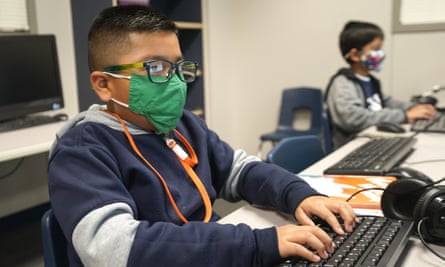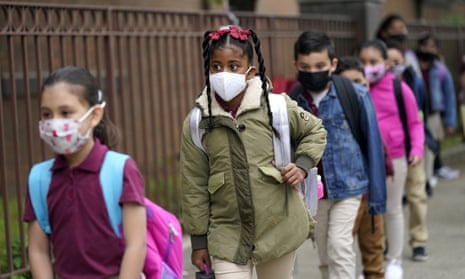The Delta variant is the latest setback on our path toward a new normal. This is the fourth major Covid-19 wave, and there’s a palpable sense of morbid familiarity. We know the drill: cases rise, hospitals are pushed to their limit, and then the deaths start piling up. We have grown numb to the ongoing mass casualty event, even as friends and neighbors share their stories of debilitating chronic symptoms. But data from around the world signal that the Delta variant is different, particularly when it comes to children.
Given everything we know about the Delta variant and long Covid in children, it is immoral to send unvaccinated kids, teachers, and staff into classrooms. The Delta variant dramatically increases the risk of long-term disability or death for everyone, but especially for the 73 million children living in America. We need to adjust our back-to-school plans immediately.
The odds of transmitting the Delta variant are more than 1.6 times higher than for the Alpha variant, which fueled the prior wave. A study by Imperial College London found that Covid-19 test positivity among UK children five to 12 years was two- to six-fold higher than for persons 45 and older. As of Wednesday, one in 10 Covid-19 test results for US children five to 11 years are positive, and the week-over-week rise in test positivity is climbing fastest for this age group. Covid-19 test positivity among US children 12-17 (12.3%) is higher than for any other age group.
A published report of Scottish data noted that the Delta variant doubles the risk of Covid-19 hospitalization, regardless of age. The number of US children in the hospital due to Covid-19 doubled between 30 June and 31 July. On Thursday, US hospitals reported 249 pediatric admissions due to Covid-19, which is four admissions shy of the all-time single-day record (253). On a population-adjusted basis, the weekly average of US children admitted to hospitals with Covid-19 is rising faster than any other age group (as of Wednesday).
There is growing evidence to show that even mild or asymptomatic cases of Covid-19 among children can evolve into chronic (“long”) Covid. Newly published research suggests that at least one in 25 children with Covid-19 experience symptoms lasting more than four weeks. A separate UK government report estimates that at least one in eight children still have symptoms five weeks after their initial infection. Emerging data also suggests that up to one in 50 asymptomatic Covid-19 cases among children will evolve into chronic Covid.
The good news is that our vaccines are highly effective against the Delta variant. Fully vaccinated persons have a significantly lower risk of developing symptoms, requiring hospitalization, or dying from Covid-19. The rate of Delta variant infection is three times lower among fully vaccinated persons, and the risk of developing long Covid is reduced by half. There is even preliminary data suggesting that mRNA-based vaccines may alleviate some symptoms of long Covid.
Make no mistake about it: vaccines save lives, but they are not enough to stop the spread of the Delta variant on their own. A new report out of the UK found that 44% of Delta variant infections occurred in fully vaccinated individuals. The US share of new Covid-19 cases among fully vaccinated individuals is expected to grow as more people are exposed to the Delta variant. Once infected, fully vaccinated people can (and do) transmit the novel coronavirus to others, albeit at half the rate of unvaccinated persons. Within a household, the rate of transmission of the Delta variant from a fully vaccinated person to an unvaccinated household member is at least 10%. Mississippi and Florida officials are learning, the hard way, that Delta variant spreads like wildfire inside of school buildings, particularly in the absence of universal masking and proper ventilation.

Masks reduce transmission and save lives. Surgical masks have been shown to reduce the risk of infection for the wearer by up to 67%. The latest projections from the University of Washington’s Institute for Health Metrics and Evaluation estimates that over 47,000 lives could be spared between now and October 31, if more than 95% of the population were to mask up in public. But masks are not enough, and we should expect at least 24,000 Covid-19 deaths from the current wave.
It is biologically impossible to test our children to safety. A new study showed that persons infected with the Delta variant had produced around 1,000 times more copies of the virus by the time they tested positive, as compared to persons infected with the original (novel coronavirus-2019) strain. The study traced 167 infections to a single index case. A separate study traced a total of 47 cases (including 21 secondary cases) to a single person. Simply put: the Delta variant makes each of its hosts into a walking super-spreader event before the person even realizes they’ve been infected.
The practical implication of these findings is that school reopening plans that hinge on universal mask mandates and frequent testing are doomed to fail. The UK’s experience offers a real-world lesson that we, in the US, must take to heart. Despite aggressive mitigation efforts and a $4.2bn whole-of-government testing program, one in 250 schools in England have experienced at least one Delta variant outbreak in the last four weeks. The reason for the failure is obvious: children in the UK have yet to become eligible to receive the Covid-19 vaccine.
We know what we have to do. Financial services, media, and technology companies are postponing their return-to-office plans. Several states are mandating indoor masking. New York City will require proof of vaccination for indoor dining, and other major cities are poised to follow suit. Employers are stepping up their efforts to vaccinate employees; and some are even mandating Covid-19 vaccinations. We know better than to send unvaccinated and/or unmasked persons into enclosed spaces. We should extend that logic to children and the spaces they inhabit as well.
We have strong data to support a set of federal minimum standards for schools. At a bare minimum, every classroom needs to have proper ventilation and every person that sets foot on a school campus must be masked at all times. For their own safety, and the safety of children, all faculty and staff must be fully vaccinated. For their own safety and to mitigate the impact of breakthrough cases, indoor instruction should be restricted to fully vaccinated students only. For the same reason, campuses with indoor cafeterias should be required to schedule meal breaks according to vaccination status. Where space and weather allows, outdoor seating should be made available to children. If any of these measures cannot be instituted, for any reason, then schools must offer the option of virtual learning.
Schools have the funding to implement these changes, but they lack clear and concise federal guidelines. Billions in federal funding have been earmarked specifically to keep children safe from Covid-19. Several federal agencies need to work together to clarify their guidance, and coordinate enforcement of these minimum standards.
If the task is approached thoughtfully, but with urgency, we stand a good chance of navigating the school year without jeopardizing the health and wellbeing of the 45 million children who are currently ineligible for vaccination. Above all, we must approach back-to-school with eyes wide open: the Delta variant leaves absolutely no margin for error.
Dr Jorge A Caballero is a board-certified anesthesiologist, data engineer and health equity advocate. His work has informed congressional action and his analyses of Covid-19 disparities have been featured by the San Francisco Chronicle, Axios, ABC News, and the Wall Street Journal
